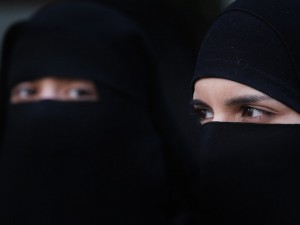
As we were driving toward Baden Baden in Germany, our tour director pointed to the brand new mosque rising above the red-roofed houses. “This mosque was not there last year,” he commented. On a recent river cruise through five European countries — Belgium, The Netherlands, Germany, France and Switzerland – it was impossible not to notice the increasing presence of Islam — or at least our perception of it.
In the tense international context of conflict with the Islamic State, there is a feeling in Europe of being caught in a two-pronged threat, both from within and abroad. This is why many believe that it is more important than ever for the Muslims living in Europe, moderate in the majority, to speak up with a loud voice against Daesch violence.
 There are more than 40 million Muslims in Europe, which translates to an average of 8 percent of the population. France has the largest percentage with 10 percent versus 0.6 percent in the US. The Muslim inhabitants are mostly concentrated in urban areas, where they can sometimes reach 20 percent and even 30 percent as in Basel, Switzerland.
There are more than 40 million Muslims in Europe, which translates to an average of 8 percent of the population. France has the largest percentage with 10 percent versus 0.6 percent in the US. The Muslim inhabitants are mostly concentrated in urban areas, where they can sometimes reach 20 percent and even 30 percent as in Basel, Switzerland.
For an American readership it is hard to grasp the impact of such a concentration on the urban landscape. Living in Europe, one has to adjust to the changing profile of the Muslim community. Take, for instance, the recent announcement made by the rector of the Great Mosque of Paris that the number of mosques existing today — 2,000 — in France needs to be doubled.
In early April, L’Union des Organisations Islamiques de France (UOIF — the Union of Muslim Organizations of France) held its 33rd annual gathering at Le Bourget, north of Paris. For three days, thousands flocked to this event, bringing their families and looking forward to do some shopping or attending seminars. French Prime Minister Manuel Valls expressed some concern that the Muslim Brotherhood, which conceived this event, might exert too much influence on the crowds.
One forum attracted many visitors and one, an older man, said, “At the mosque, I am a Muslim — in the street I am a lay person. When I became French, I accepted the 1905 law of separation of Church and State and I respect the idea of a secular State.” A young lawyer retorted, “I was born in France, which gave me some rights. Today I demand that these rights be respected.” This heated exchange epitomizes the contrast of attitudes between generations of immigrants.
A disturbing trend is the radicalization of the European Muslim community by the Salafists – a conservative Sunni sect. They want Islam to return to its original form with a strict application of the Sharia. A journalist describes how, 20 years ago, a suburb outside Montpellier had a theater and drama workshops, where young people loved to practice on the stage. Today the theater is run down and empty. The Salafists have ordered the premises to be closed, and forbade the women to appear in public. Le Monde published an article describing the growing number of Salafists in Dusseldorf, but also stressing the distinction between Salafist true believers and “pseudo Salafists,” who are potential jihadists.
Once more France is in the line of fire for its military interventions in several parts of the world. Recently the screens of TV5 Monde, a television station broadcasting programs in the French language to 200 countries, turned black for 20 hours. One viewer, in Zarhle, Lebanon, said, “I am not even French, but for me the programs offered by TV5 Monde represent culture, a window onto the free world.”
One can only hope that the ongoing destruction of archaeological sites, the attacks on journalists and the hacking of channels of communication with their social networks, are not going to be followed by further cyber attacks.

About the author: Nicole Prévost Logan divides her time between Essex and Paris, spending summers in the former and winters in the latter. She writes a regular column for us from her Paris home where her topics will include politics, economy, social unrest — mostly in France — but also in other European countries. She also covers a variety of art exhibits and the performing arts in Europe. Logan is the author of ‘Forever on the Road: A Franco-American Family’s Thirty Years in the Foreign Service,’ an autobiography of her life as the wife of an overseas diplomat, who lived in 10 foreign countries on three continents. Her experiences during her foreign service life included being in Lebanon when civil war erupted, excavating a medieval city in Moscow and spending a week under house arrest in Guinea.